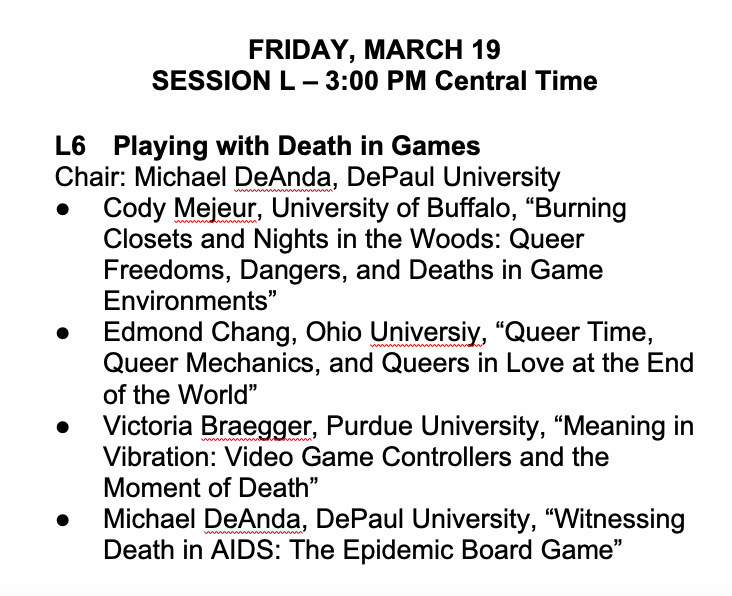I am looking forward to presenting at the Society for Cinema and Media Studies’s annual conference, which will b held virtually March 17-21, 2021. I present on Friday, March 19 as part of a panel on “Playing with Death in Games.” I am honored to present and discuss alongside Cody Mejeur, Michael DeAnda, and Victoria Braegger. (I have known some of these folks online, on Twitter, and from their work; this will be my first time actually “meeting” them.) It has been a while since I have been to SCMS (it is notoriously challenging to get into), and I am sad that we will not be gathering in person. It would have been nice to see the many friends and peers I know from media studies and game studies circles! I am going to try to attend as many sessions as I can (though the zoom fatigue is all too real).


I am presenting a beefed up version of my short In Media Res piece “Queer Dystopias, Queer Mechanics, and Queers in Love at the End of the World.” My presentation is entitled “Queer Mechanics, Queering Death: Queers in Love at the End of the World and Infinite, Intimate.” Here’s a bit of the argument:
For today’s presentation, I want to muse on and offer a few provocations about death—specifically in digital games—about diegetic and ludic temporalities and spaces of death—particularly to look at two independent games created by queer developers that queer the mechanic of death, embracing Eve Sedgwick’s definition of queer and queering as the “open mesh of possibilities” that challenge normative structures, narratives, and technologies. There is a growing body of work on death and video games; I want to highlight the 2017 special issue on “permadeath” of the Journal of Gaming and Virtual Worlds edited by Alenda Chang, Jesus Costantino, and Braxton Soderman, which informs much of my close readings today. The introduction to the issue surveys the usual mechanics of death in video games: from coin-operated arcade games (where we get the idiom of extra lives) to the advent of saved games and easy modes to the recent celebration of hard modes, “ironman runs,” and permanent death; the editors say, “Game death has become less a matter of lost pockets of change than lost pockets of time” (104). Rather than rehearse arguments about the ways death functions solely in terms of narrative (i.e. this is a game about death, killing, war) or identification (i.e. my character just died), I want to offer two close playings that demonstrate ways games might foil the usual mechanics of death and to meditate on the possibility of queering death as a challenge to the technonormative and chrononormative (a la Elizabeth Freeman) structures in and out of games.
If you want to play the two games I look at, they are available online:
- Anna Anthropy’s Queers in Love at the End of the World: https://w.itch.io/end-of-the-world
- Robert Yang’s Infinite, Intimate: https://radiatoryang.itch.io/intimate-infinite